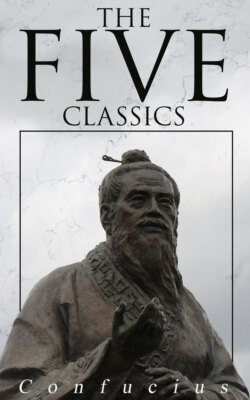Читать книгу The Five Classics - Confucius - Страница 22
На сайте Литреса книга снята с продажи.
ОглавлениеHexagram VI.6 Sung
Table of Contents
Sung intimates how, though there is sincerity in one's contention, he will yet meet with opposition and obstruction; but if he cherish an apprehensive caution, there will be good fortune, while, if he must prosecute the contention to the (bitter) end, there will be evil. It will be advantageous to see the great man; it will not be advantageous to cross the great stream.
1. The first line, divided, shows its subject not perpetuating the matter about which (the contention is). He will suffer the small (injury) of being spoken against, but the end will be fortunate.
2. The second line, undivided, shows its subject unequal to the contention. If he retire and keep concealed (where) the inhabitants of his city are (only) three hundred families, he will fall into no mistake.
3. The third line, divided, shows its subject keeping in the old place assigned for his support, and firmly correct. Perilous as the position is, there will be good fortune in the end. Should he perchance engage in the king's business, he will not (claim the merit of) achievement.
4. The fourth line, undivided, shows its subject unequal to the contention. He returns to (the study of Heaven's) ordinances, changes (his wish to contend), and rests in being firm and correct. There will be good fortune.
S. The fifth line, undivided, shows its subject contending;--and with great good fortune.
6. The topmost line, undivided, shows how its subject may have the leathern belt conferred on him (by the sovereign), and thrice it shall be taken from him in a morning.
Footnotes
6. We have strength in the upper trigram, as if to regulate and control the lower, and peril in that lower as if looking out for an opportunity to assail the upper; or, as it may be represented, we have one's self in a state of peril matched against strength from without. All this is supposed to give the idea of contention or strife. But the undivided line in the centre of Khân is emblematic of sincerity, and gives a character to the whole figure. An individual, so represented, will be very wary, and have good fortune; but strife is bad, and if persevered in even by such a one, the effect will be evil. The fifth line, undivided, in an odd place, and central, serves as a representative of 'the great man,' whose agency is sure to be good; but the topmost line being also strong, and with its two companions, riding as it were, on the trigram of peril, its action is likely to be too rash for a great enterprise. See the treatise on the Thwan, in loc.
The subject of line 1 is weak and at the bottom of the figure. He may suffer a little in the nascent strife, but will let it drop; and the effect will be good.
Line 2 represents one who is strong, and has the rule of the lower trigram;--he has the mind for strife, and might be expected to engage in it. But his strength is weakened by, being in an even place, and he is no match for his correlate in line 5, and therefore retreats. A town or city with only three hundred families is said p. 71 to be very small. That the subject of the line should retire to so insignificant a place is further proof of his humility.
Line 3 is weak and in an odd place. Its subject therefore is not equal to strive, but withdraws from the arena. Even if forced into it, he will keep himself in the background;--and be safe. 'He keeps in the old place assigned for his support' is, literally, 'He eats his old virtue;' meaning that he lives in and on the appanage assigned to him for his services.
Line 4 is strong, and not in the centre; so that we are to conceive of its subject as having a mind to strive. But immediately above it is line 5, the symbol of the ruler, and with him it is hopeless to strive; immediately below is 3, weak, and out of its proper place, incapable of maintaining a contention. Its proper correlate is the lowest line, weak, and out of its proper place, from whom little help can come. Hence its subject takes the course indicated, which leads to good fortune.
Line 5 has every circumstance in favour of its subject.
Line 6 is strong and able to contend successfully; but is there to be no end of striving? Persistence in it is sure to end in defeat and disgrace. The contender here might receive a reward from the king for his success; but if he received it thrice in a morning, thrice it would be taken from him again. As to the nature of the reward here given, see on the Lî Kî, X, ii, 32.
P. Regis explains several of the expressions in the Text, both in the Thwan and the Hsiang, from the history of king Wăn and his son king Wû. Possibly his own circumstances may have suggested to Wăn some of the Thwan; and his course in avoiding a direct collision with the tyrant Shâu, and Wû's subsequent exploits may have been in the mind of the duke of Kâu. Some of the sentiments, however, cannot be historically explained. They are general protests against all contention and strife.
